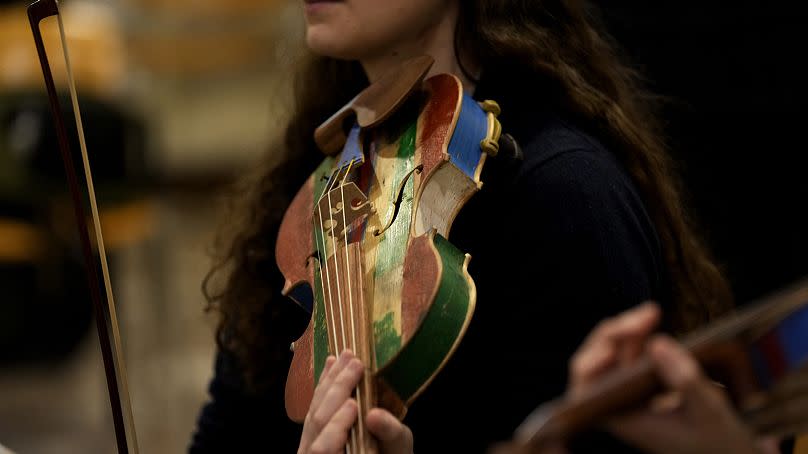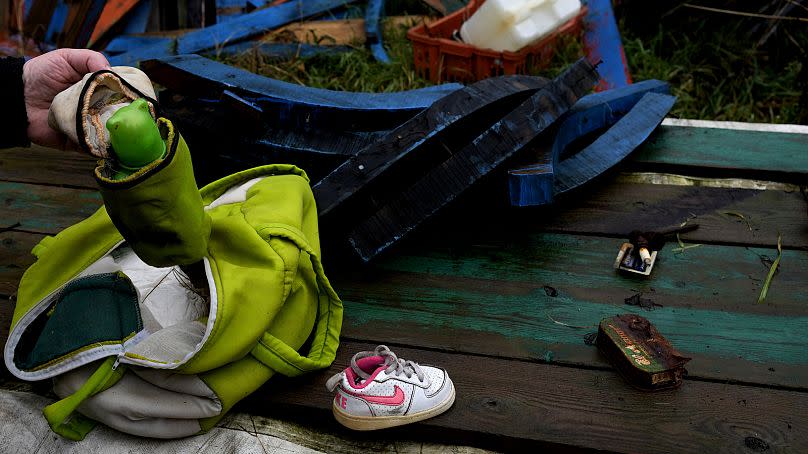Violins made from battered migrant boats feature at Milan's La Scala theatre
As the Orchestra of the Sea debuted at Milan's famed Teatro alla Scala, the violins, violas and cellos carried tales of desperation and redemption.
Inmates from Milan's largest prison have been bending, chiseling and gouging the wood from battered boats used by human smugglers to bring migrants to Italy – transforming them into instruments.
The project, dubbed Metamorphosis, focuses on transforming what otherwise might be discarded into something of value to society: rotten wood into fine instruments, inmates into craftsmen, all under the principle of rehabilitation.
Two inmates were granted leave to see the Orchestra of the Sea's debut concert this Monday. The concert featured 14 prison-made stringed instruments playing a program that included works by Bach and Vivaldi.
The two prisoners sat in the royal box alongside Milan Mayor Giuseppe Sala.

“I feel like Cinderella,” said Claudio Lamponi, an inmate. “This morning I woke up in an ugly, dark place. Now I am here.”
Far from the stately La Scala opera house, the Opera prison on Milan’s southern edge has over 1,400 inmates, including 101 suspected Mafia members held under a strict regime of near-total isolation.
Other inmates, like Nikolae, who joined Lamponi at La Scala, are allowed more latitude.
Since joining the prison’s instrument workshop in 2020, Nikolae – who declined to give his full name and prefers to skim over the charges that landed him in prison a decade ago – has become Opera’s master craftsman, graduating from crude instruments made out of plywood to harmonious violins worthy of La Scala’s stage.

“That’s how I began to speak with the wood," Nikolae said recently in the prison workshop, which is filled with the smell of wood chips amid the rows of chisels and the faint hum of a jigsaw. “I started with very poor materials, and they saw I had good dexterity.”
Working on the instruments four to five hours a day gives him a sense of tranquility, he said, to reflect on “the mistakes I made” and skills that allow him to consider a future. “I am gaining self-esteem,’’ he said, “which is no small thing.”
One “graduate” of the prison workshops has completed his sentence and is working as a master luthier at another prison, in Rome.
“I hope one day, I can be recuperated, like this violin,'' Nikolae said.
The boats arrive at Opera much as they were seized, still containing remnants of the migrants’ lives, and with them a reminder of the 22,870 migrants that the UN says have died or gone missing on the perilous central Mediterranean crossing since 2014.
A shoulder bag with a disposable diaper, baby bottle and infant shoes sits on one prow alongside tins of anchovies and tuna from Tunisia and many plastic sandals.

Each instrument takes 400 hours to create, from disassembling the boats to the finished product.
“These instruments, which have crossed the sea, have a sweetness that you could not imagine,’’ said cellist Mario Brunello, a member of the Orchestra of the Sea. “They don’t have a story to tell. They have hope, a future.”
The House of the Spirit and Arts Foundation that first brought workshops for making stringed instruments to four Italian prisons a decade ago hopes the concert at La Scala will be the start of a movement to bring Orchestra of the Sea performances first to the southern European countries bearing the brunt of migration, then to the northern capitals that hold the most sway in migrant policy.
“The beauty is that music overcomes all divisions, all ideologies, goes to the heart and soul of people, and one hopes that it makes people think," said foundation president Arnoldo Mosca Mondadori. “Politicians need to think of this drama."


